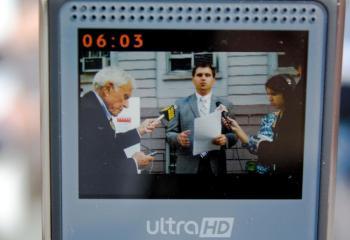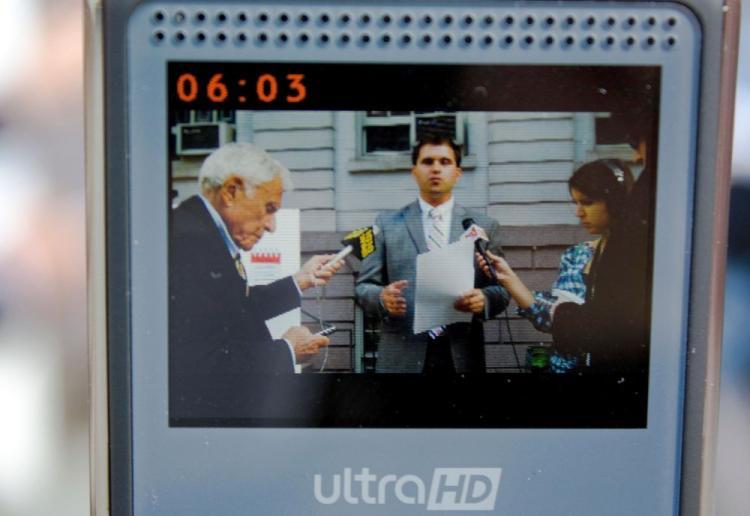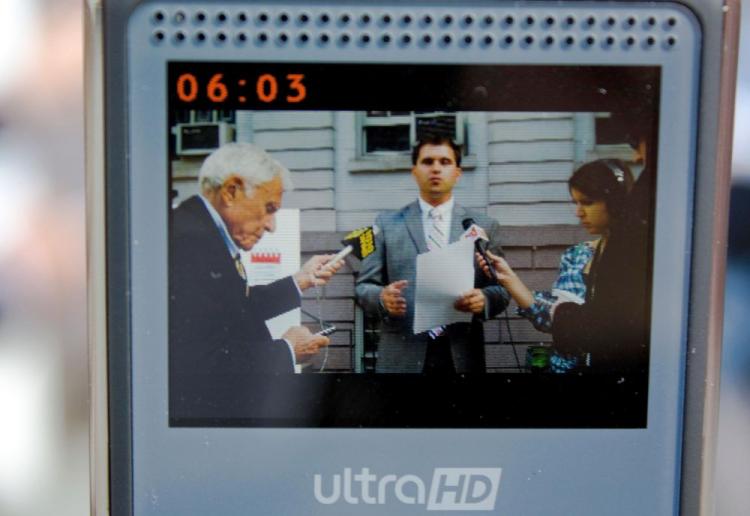NEW YORK—Standing among a small gaggle of local media near the steps of City Hall, Alex Zablocki ran through his campaign points in a rapidfire speech on Wednesday.
He spoke about reforming the office of public advocate and the need to “put someone in the office that understands the position.”
The public advocate’s role is that of city ombudsman and a check on the mayor’s power.
“I am that person,” he said during his presentation, several times.
His chances are slim, however, given that New York City is so heavily Democratic. New York City is traditionally a five-to-one democratic/republican ratio.
Zablocki has dozens of ideas for what he'll do if he does get elected, though, including a “govbook” initiative, a la Facebook, giving city departments a streamlined way of communicating with one another.
One of the first things he would do if he got into office would be to reduce the power of that office—for starters, by making the comptroller the stand-in mayor, instead of the public advocate, when the elected mayor is unable to serve.
Zablocki, 26, is from Staten Island and sometimes speaks in truisms, like “People should run for public advocate to fulfill the duties of the City Charter for public advocate” and “It ain’t over ’till it’s over,'” referring to the election race.
He’s optimistic about his chances and is aware that he is in the running for a position that most New Yorker’s don’t really understand.
This would change under his watch, he said, outlining plans to establish a branch office in every borough, “working closely with every community board to identify problems in government and improve city services.”
He rattled off the list of duties a public advocate usually engages in, including sitting on a series of committees, taking complaints from people, looking for how to improve governmental processes, and more.
Zablocki said he was frustrated by the low turnout at the recent polls and brought attention to the role of the Working Families Party in “pulling out votes,” an especially useful strategy in run-offs or when there is little electoral interest.
This strategy includes organizing buses to polling stations, giving people time off work to vote, and knocking on thousands of doors promoting a candidate.
“They’re across the areas. The Working Families Party has the Data and Field Services [a firm], and they are really controlling the process,” he said. “They figured it out, and now they are controlling the process.”
Instead of this sort of politicking, he advocates what he regards as a sincere engagement with the community, and hopes voters get to know the person they are voting for and the reasons they are voting for them.
One of the themes of Zablocki’s campaign is that the appointee makes or breaks the usefulness of the public advocate’s office.
“I was an eagle scout. I was always told to be prepared,” he said at the tail-end of the press conference. “I’m prepared for this.”
He spoke about reforming the office of public advocate and the need to “put someone in the office that understands the position.”
The public advocate’s role is that of city ombudsman and a check on the mayor’s power.
“I am that person,” he said during his presentation, several times.
His chances are slim, however, given that New York City is so heavily Democratic. New York City is traditionally a five-to-one democratic/republican ratio.
Zablocki has dozens of ideas for what he'll do if he does get elected, though, including a “govbook” initiative, a la Facebook, giving city departments a streamlined way of communicating with one another.
One of the first things he would do if he got into office would be to reduce the power of that office—for starters, by making the comptroller the stand-in mayor, instead of the public advocate, when the elected mayor is unable to serve.
Zablocki, 26, is from Staten Island and sometimes speaks in truisms, like “People should run for public advocate to fulfill the duties of the City Charter for public advocate” and “It ain’t over ’till it’s over,'” referring to the election race.
He’s optimistic about his chances and is aware that he is in the running for a position that most New Yorker’s don’t really understand.
This would change under his watch, he said, outlining plans to establish a branch office in every borough, “working closely with every community board to identify problems in government and improve city services.”
He rattled off the list of duties a public advocate usually engages in, including sitting on a series of committees, taking complaints from people, looking for how to improve governmental processes, and more.
Zablocki said he was frustrated by the low turnout at the recent polls and brought attention to the role of the Working Families Party in “pulling out votes,” an especially useful strategy in run-offs or when there is little electoral interest.
This strategy includes organizing buses to polling stations, giving people time off work to vote, and knocking on thousands of doors promoting a candidate.
“They’re across the areas. The Working Families Party has the Data and Field Services [a firm], and they are really controlling the process,” he said. “They figured it out, and now they are controlling the process.”
Instead of this sort of politicking, he advocates what he regards as a sincere engagement with the community, and hopes voters get to know the person they are voting for and the reasons they are voting for them.
One of the themes of Zablocki’s campaign is that the appointee makes or breaks the usefulness of the public advocate’s office.
“I was an eagle scout. I was always told to be prepared,” he said at the tail-end of the press conference. “I’m prepared for this.”







